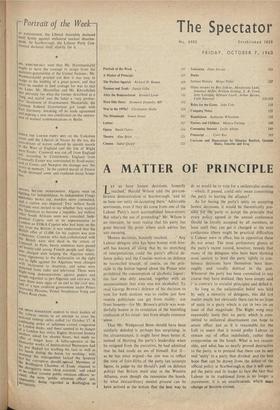A MATTER OF PRINCIPLE
' ET us have honest decisions, honestly L reached,' Harold Wilson told the pre-con- ference demonstratidn at Scarborough. 'and let us base our unity on accepting them.' Admirable sentiments, even if they do come from one of the Labour Party's most accomplished fence-sitters. But what's the use of pretending? Mr. Wilson is no innocent; he must realise that his party has gone beyond the point where such advice has any meaning.
'Honest deciSionS, hOnestly reached. . . .' Any Labour delegate who has been honest with him- self has known all along that by no stretching of interpretations could the party's official de- fence policy and the Cousins motion on defence be reconciled (except, of course, on the prin- ciple in the Italian legend about the Prince who prohibited the consumption of alcoholic liquor: the law was duly enacted, together with an announcement that wine was not alcoholic). To read George Brown's defence of his decision to vote for both motions was to realise just how remote politicians can get from reality: not from honesty—for Mr. Brown's article was won- derfully honest in its revelation of the bumbling confusion of his mind—but from simple common sense.
That Mr. Wedgwood Benn should have been similarly deluded is perhaps less surprising; in the circumstances, it might have been better if, instead of blaming the party's leadership when he resigned from the executive, he had admitted that he had made an ass of himself. For if— as he has since argued—his aim was to reflect the view of four-fifths of the party (an accurate figure, to judge by the Herald's poll on defence policy) that Britain must stay in the Western Alliance, even though she renounces the bomb, by what extraordinary mental process can he have arrived at the notion that the best way to
dc, so would be to vote for a unilateralist motion which, if passed, could only mean committing the party to leaving the alliance?
As for basing the party's unity on accepting honest decisions, it would be theoretically pos- sible for the 'party to accept the principle that every policy agreed at the annual conference Should be loyally accepted by all members, at least until they can get it changed at the next conference (there might be practical difficulties H Labour were in office, but in opposition these do not arise). The most perfunctory glance at the party's recent record, however, reveals that many of the delegates who have been showing most anxiety to bind the party tightly to con- ference decisions have themselves been thor- oughly and vocally disloyal in the past. Whenever the party has been committed to any course they have disliked, they have simply said i' is contrary to socialist principles and defied it.
So long as the unilateralist belief was held by only a minority of delegates, this did not matter much; but obviously there can be no hope of unity in a party which is cut in two on an issue of that magnitude. The Right wing may reasonably insist that no party which is com- mitted to unilateral disarmament can hope to attain office; just as it is reasonable for the Left to assert that it would prefer Labour to remain out of office indefinitely, rather than compromise on the bomb. What is not reason- able, and what has so nearly 'proved destructive to the party, is to pretend that there can be any
real 'unity' in a party thus divided; and the best hope that can be drawn from the defeat of the official policy at Scarborough is, that it will com- pel the party and its leader to face the fact that Labour in its traditional .form is no longer a movement; it is an anachronism, which must change or become extinct.










































 Previous page
Previous page